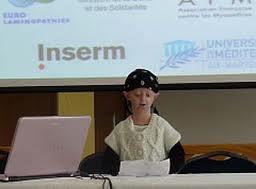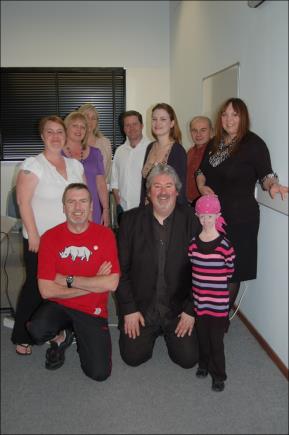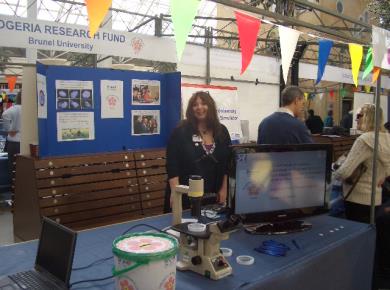Engaging with Premature Ageing: Families, Community and Society
Submitting Institution
Brunel UniversityUnit of Assessment
Allied Health Professions, Dentistry, Nursing and PharmacySummary Impact Type
HealthResearch Subject Area(s)
Biological Sciences: Biochemistry and Cell Biology
Medical and Health Sciences: Neurosciences, Oncology and Carcinogenesis
Summary of the impact
The Progeria Research Team at Brunel has been researching Progeria for
over 10 years. Interestingly, they have close contact with Progeria
families and support them by helping parents make decisions about drug
treatments available in clinical trials and providing scientific
information about the disease and the team's research. The Progeria
research has allowed the team to engage directly and positively with
individuals and communities that raise money and awareness for Progeria
research in interesting and entertaining ways. The team have raised public
understanding and awareness of Progeria locally, nationally and globally.
This has been done directly, and also by facilitating the production of a
film and a TV programme about the disease.
Underpinning research
Drs Kill (Senior Lecturer) and Bridger (Reader) brought Progeria research
back to the UK in 2002 by combining their expertise to work on the
premature ageing disease when it was discovered that Progeria was caused
by a mutation in lamin A, a protein in the cell nucleus. This resulted in
a seminal publication in 2004 (cited 92). The data showed that Progeria
cells behaved differently from what was expected and help explain why the
children age so rapidly. Based on this research and the interest it
generated, the team has expanded with 4 more group leaders being
incorporated into the team (Drs Eskiw, Makarov, Tree, Vagnarelli), with 8
PhD students and a fully funded post-doctoral scientist (Clements)
analysing the effect of different drugs on Progeria cells. Brunel's
research into Progeria spans from the control of individual gene
expression to a whole organism model for Progeria; from basic
understanding to developing a cure.
The research has been funded by the Brunel Progeria Research Fund
(established 2003), the US Progeria Research Foundation and the children's
medical research charity Sparks. The team have published 10 articles
describing a Drosophila model of Progeria (2008), how Progeria cells are
hyperproliferative and surcumb to suicide (2004, 2007), how the genome
does not behave properly in Progeria nuclei (2005, 2007, 2011), that
structures are aberrant in Progeria cells (2007, 2008, 2010) and how this
is corrected by a drug in the US clinical trial (2010, 2011). There are 5
manuscripts in preparation on gene expression changes in Progeria, how the
gene is regulated and the behaviour of stem cell populations in the fly
model. Unpublished data from these studies has been presented at national
and international conferences (2013, 2012, 2009).
The research remit of the team is to understand the basic biology of
Progeria, test the safety and efficacy of drugs, identify and develop new
treatments and work towards a cure. The team has on-going successful
projects that address all these aspects of their vision.
The work funded by Sparks recapitulates in vitro on-going and
current proposed drug trials. There are already very interesting results
that have been disseminated to researchers at the 6th Nuclear
Envelope and Chromatin Organisation meeting held at Brunel, September
2013, showing Pravastatin as a drug that has positive benefits on Progeria
cells. Other data have the potential to alter on-going drug trials.
Research from Kill and Makarov groups promise a cure to Progeria by
understanding how the toxic protein in Progeria can be degraded by the
cell or by controlling the expression of the toxic protein, presented in
2013 to clinicians, families and researchers. Our Progeria research has
impact on the study and treatment of normal ageing since Progeria arguably
is the best model for normal ageing. Progress in this field also has value
for the future treatment of conditions such as cancer since many cancers
have Progeria lamin A. Understanding the basic biology of the ageing
process supports the strategic aim of UK Research Councils, the European
Commission and the National Institute for Aging in the USA.
References to the research
1) Bridger J.M. and Kill I.R. (2004) Ageing of Hutchinson-Gilford
Progeria Syndrome fibroblasts is characterised by hyperproliferation and
increased apoptosis. Experimental Gerontology 39 717-724.
Details of the impact
Supporting the Families
The team at Brunel helps and supports the children and their families,
primarily by continuing to ensure that the research into Progeria
progresses and keeping the families informed of the progress. Members of
the Progeria research team are proactively involved with families of
Progeria sufferers. Dr Bridger is in active contact with The Okines and
The Crowther families, and monitors how Hayley Okines (http://en.wikipedia.org/wiki/Hayley_Okines)
is progressing both at home and on her medical visits to the US. The team
are also members of the Progeria Family Circle, informing them of their
progress (https://www.facebook.com/#!/familycircleprogeria?fref=ts)
and the Atypical Progeria Group. The team have presented their work and
findings to families of Progeria suffers in the UK (2011), the US (2013,
2010, 2008) at the Progeria Research Foundation workshops and Italy (2012)
at the Progeria Family Meeting.
 Figure 1
Figure 1
On April 15th 2011 Dr Kill organised the 1st UK Progeria
Research Day at Brunel
(http://www.ncbi.nlm.nih.gov/pmc/articles/PMC3324340/pdf/nucl-2-517.pdf)
where scientists and clinicians spoke and mingled with The Okines and The
Crowthers. Hayley Okines, who has Progeria, spoke to the scientists about
her life (Figure 1) and Harry Crowther who suffers from an even rarer form
of Progeria wrote on his website how much he enjoyed his day at Brunel.
(A) In order to help Progeria suffers such as Harry, Dr Bridger has set up
a new collaborative cross-Europe consortium to decipher how Harry's lamin
works differently to Hayley's so that drug treatments for suffers of
Progeria that make a different toxic protein can have some hope of a
treatment. The initial meeting of the network has been funded by Sparks.
 Figure 2
Figure 2
However, the most significant interactions and support that the team has
had is when The Okines family came to Brunel University to film one of the
TV documentaries on the family "The-96-year old schoolgirl" (http://www.channel5.com/shows/extraordinary-people/episodes/extraordinary-people-hayley-the-96-year-old-schoolgirl,
Figure 2).
An excerpt from the book "Old Before My Time; Hayley Okines' Life with
Progeria" written by Hayley and Kerry Okines reveals that Dr Kill
helped the Okines make a potentially life-changing decision by
demonstrating how the new drugs suggested to the family by the US clinical
trial team might help Hayley's Progeria (B). After talking to Dr Kill the
family made the decision to commit to the new combinatorial 3 drug trial,
which seems to have had Figure 2 positive results for Hayley.
During this same visit the team learnt that Hayley's mother was seeking
funding for a reunion event of children with Progeria after the one in the
US had been cancelled. The Development Office at Brunel University was
able to identify a sponsor who agreed to fund the event at the Ashford
Hotel in Kent in 2010 for ~ 20 families with Progeria children staying for
1 week.
Engaging with Individuals and Communities
The research conducted by the team at Brunel has also impacted on the
activities of numerous individuals and organisations that have learnt
about Progeria through the dissemination of the research, internet
searches or media articles and programmes that highlight the team and its
research. Individuals decide to take part in sporting events such as
marathons to help fund the work, school children find inventive ways to
raise money for the team and a retirement group make Christmas decorations
to fund the work. Individuals from Brunel itself have got behind the team
as a home-made charity it can support. They raise thousands of pounds by
hosting social evenings and baking cakes. Other individuals have donated
prizes for the best undergraduate and Masters' projects in Progeria
research — that have led to local press releases. Dr Bridger has been
invited to give many talks over the years to the laypeople describing
Progeria and Brunel University's role. Hundreds of people have been
exposed to and have actively taken part in raising the awareness of
Progeria by doing something positive and fun for themselves. Organisations
such as the Royal Anti-Diluvean Order of the Buffaloes (2008), the
Freemasons (2013), and Ruislip St Martin's Lodge have each raised
over £5,000 for Progeria research (C). Drs Bridger and Kill spent time
with the Buffaloes in Epping Forest at a number of their social events —
chatting about their work and Progeria (2008); and provided images and
information for a presentation of their work to 500 Freemasons at a
special dinner (2013). Other organisations that have requested talks and
information are the Soroptomists (D), which represent a powerful
female voice in international awareness and lobbying and the Athena
group of female professional and business women. Dr Kill took part in the
University's series of public lectures as one of three presenters
contributing to a lecture entitled "Can We Live Forever" and
highlighted the work of the research team (E). There were over 200 members
of the public in the audience who participated in a lively debate.
 Figure 3
Figure 3
In March 2010, the team took part in a public presentation of their
research at a local science fair in Uxbridge, Middlesex (Figure 3),
speaking to local shoppers about Progeria and their findings.
On June 8th 2013 Drs Bridger and Kill, along with Prof Shananan of Kings
College London presented to a paying audience "Ageing Fast and Slow"
a topic at The Times Cheltenham Science Festival. There were nearly 100
members of the public at the event and it was actively tweeted about. The
audience asked some well-informed questions and showed a lot of interest
in Progeria (F).
The team are also acting as consultants for Sparks to train individuals
from this organisation about Progeria and the research happening at
Brunel. They have run 2 training sessions this year already (April and
November), where Dr Bridger gives a presentation and other members of the
team run "lab tours".
Raising Awareness and Promoting Public Understanding The original
underpinning work research findings were taken up by the media and the
team was interviewed for articles, radio and international television
programmes. HRH Prince Philip also requested to meet the team in 2008.
Since 2008, the team continue to be involved in informing the UK and the
world about their work and Progeria. Dr Clement's arrival at Brunel has
been championed by Sparks to raise public awareness of Progeria and there
have been local press releases in the area around Brunel and where Dr
Clements lives (G). Dr Lynda Shaw a local neuroscientist has adopted
Brunel's Progeria research to highlight and fundraises for Progeria
research at Brunel (http://www.drlyndashaw.com/#!progeria/c1oan)
and she has recently been in a number of high profile magazines discussing
Progeria (H).
In 2005, a PhD student with the team, met with the Khan family in
Kolkata, India to initiate contact and to commence a research study; 4 of
6 children in the Khan family suffer from a rare form of Progeria. (http://news.bbc.co.uk/1/hi/world/south_asia/4286347.stm)
Incidentally, as a consequence of this meeting, his sister featured as a
wardrobe designer in the Bollywood movie about Progeria called Paa
(English: Father) in 2009; this film has educated many thousands of people
about Progeria.
In 2010 The Brunel team helped James Routh of Rabbit productions to film
"Hayley-The 96-year old schoolgirl" for the Extraordinary People
series (I) by providing information and film footage of flies with
Progeria. This had ratings of 1.43million on the night. Dr Ian Kill was
also featured in the programme. In 2011 Hayley was filmed at Brunel
University at the 1st UK Progeria Research Day, giving a speech
— a topic she mentioned a lot in the documentary as she ticked off the
days on her calendar. This programme was "Hayley — the World's oldest
Teenager" (J). These shows reach an international audience.
Sources to corroborate the impact
A. Atypical Porgeria Syndrome: Harry's Story blog — Brunel University
& Alton Towers (!9 Apr 2011) http://sharron-harrysstory.blogspot.co.uk/2011/04/brunel-university-alton-towers.html
B. Excerpt from "Old Before my Time" Hayley and Kerry Okines. Accent
Press Ltd, Bedlinog 2011: "To help us learn more we visited a Progeria
expert at Brunel University in the UK. Dr Ian Kill and his team of
scientists were studying the effects of ageing in Progeria children and
normal adults...Dr Kill then sat us down and explained how the FTI
drugs, which Hayley had been taking for two years, were able to block
the pathway of the Progeria cells in the body. But he told us that
sometimes this happened late in the process and that's why his team of
scientists were trying to find ways of starting the blocking
earlier...He showed Mark and I a diagram with arrows pointing to lots of
long names. It meant nothing to us, but the long and the short of what
he was telling us was that statins, which are taken by people with high
cholesterol, could be used to treat Progeria...Armed with this new
information, Mark and I decided it was worth a try."
C. Ruislip St. Martin's Lodge, Charity Award Boosts Lodge University
Link:
http://www.ruislipstmartinslodge.com/page7.html
D. Soroptimist International, Open Council Meeting (10 March 2012): http://sigbi.org/london-chilterns/open-council-meeting-10-march-2012/
E. Brunel Public Lecture Series, `Can we live forever? — The Social and
Biological Challenges of Ageing' (08 Mar 2010): http://www.brunel.ac.uk/news-and-events/public-lectures-2013/videos/2010/can-we-live-forever
F. Ageing Fast and Slow (8 June) http://www.cheltenhamfestivals.com/science/whats-on/2013/ageing-fast-and-slow/
G. `"Dream Come True" Medical Funding' (27 Feb 2013) Uxbridge Gazette
H. `Dr Lynda Shaw helps with vital Progeria research' (27 March 2013),
Mature Times http://www.maturetimes.co.uk/health/health-news/5380-dr-lynda-shaw-helps-with-vital-progeria-research.html
`Understanding unexpected ageing' (27 Mar 2013) 50Connect:
http://www.50connect.c'o.uk/articles/understanding-unexpected-ageing
I. Channel 5 — Extraordinary People: 2010 — Hayley: The 96 Year Old
Schoolgirl
http://www.channel5.com/shows/extraordinary-people/episodes/extraordinary-people-hayley-the-96-year-old-schoolgirl
`Five's Extraordinary People watched by 1.43m', The Guardian (14 June
2010):
http://www.theguardian.com/media/2010/jun/15/extraordinary-people-channel-five-tv-ratings
J. Channel 5 — Extraordinary People: 2011 — Hayley: World's Oldest
Teenager http://www.channel5.com/shows/extraordinary-people/episodes/extraordinary-people-hayley-worlds-oldest-teenager
Contactable
- Founder of Progeria UK (Father of Hayley Okines) http://www.progeria.co.uk/
- Founder of The Progeria Family Circle
- Chief Executive of Sparks, children's medical research charity.
- Founding Director, Rabbit Productions for the Extraordinary People
series
- Dr Lynda Shaw, Neuroscientist